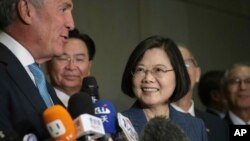Taiwan on Saturday defended a proposal to purchase $2.2 billion in arms from the U.S., following a Chinese announcement that it would sanction any American companies involved in the deal.
U.S. weapons help strengthen Taiwan’s self-defense in the face of a growing military threat from China, the defense ministry said.
“The national army will continue to strengthen its key defense forces, ensure national security, protect its homeland and ensure that the fruits of freedom and democracy won’t be attacked,” the ministry said in a statement.
China threatens sanctions
China announced late Friday that it would impose sanctions on any U.S. enterprises involved in the deal, saying it “undermines China’s sovereignty and national security.”
Taiwan split from China during a civil war in 1949, but the mainland still considers the self-governing island as part of its territory.
The U.S., which recognized Beijing as the government of China in 1979, does not have formal diplomatic ties with Taiwan, but U.S. law requires that it provide Taiwan with sufficient defense equipment and services for self-defense.
The Trump administration announced the proposed $2.2 billion sale, which would include 108 Abrams tanks and 250 Stinger surface-to-air missiles, earlier in the week.
Taiwanese president in US
Taiwanese President Tsai Ing-wen, speaking in New York Friday, said her government has strengthened Taiwan’s national defense to protect its democracy, according to a transcript posted on the presidential office website.
China has objected to her U.S. visit, which Taiwan calls a “two-evening transit stop” on the way to Haiti and three other Caribbean nations that recognize Taiwan.
“We urge the U.S. to abide by the ‘One China’ principle and ... not allow Tsai Ing-wen’s stopover, cease official exchanges with Taiwan and refrain from providing any platform for separatist Taiwan independence forces,” foreign ministry spokesman Geng Shuang said Friday in Beijng.
Tsai dismissed Chinese criticism of both her visit and the arms deal.
“We don’t need our neighbor to make irresponsible remarks,” she told reporters in New York, according to Taiwan’s official Central News Agency.
She has rejected Chinese pressure to reunite Taiwan and China under the “one-country, two-systems” framework that governs Hong Kong. She said Friday that the people of Taiwan stand with the young people of Hong Kong who are fighting for democratic freedoms in ongoing protests.
“Hong Kong’s experience under ‘one country, two systems’ has shown the world once and for all that authoritarianism and democracy cannot coexist,” she said.




